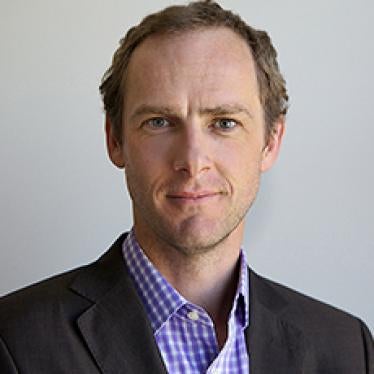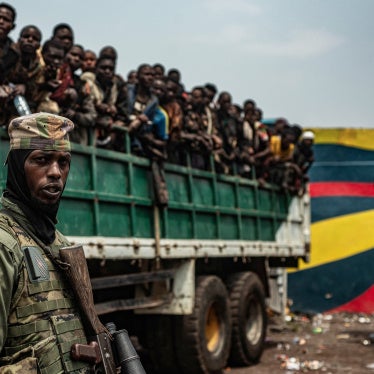My meeting with Gen. Abdallah Hamat began, surreally, with a big hug. He is a large man, one who fills out both his military uniform and the smart suit he was wearing that day. His embrace is tight and genuine. The meeting on November 15 in the capital of the Central African Republic, Bangui, however, was anything but a social occasion. I was there to ask difficult questions, ones that could implicate the general in war crimes.
It was not the first time I laid eyes on the general. Five days earlier, I watched Hamat rally his men, ex-Seleka fighters now nominally serving in the national army, in the small town of Gaga before they attacked the village of Camp Bangui. He had already taken motorcycles from local drivers to transport his men, but he was having a hard time with fuel. He called out to an amassed crowd, “Are there no loyal Muslims here to donate fuel so we can fight the enemy?” The vendors quietly started to back away, but out of either fear or obligation, some contributed.
By the next day, rumors of burned villages and dead civilians started to filter out.
On November 14, my interpreter and I took a four-hour motorbike ride on a small path and eventually arrived close to Camp Bangui. We could smell the corpses before we even arrived at the village. One young man lay dead on the trail. The village had been laid to waste. I quickly counted scores of burned homes. A casserole with food still in it rested on a burned-out cooking fire, the chair next to it overturned. Rarely does one get such intimate glimpses of the moment when a person runs for their life.
We managed to find a few people who were hiding on the outskirts of the abandoned village. They confirmed that the ex-Seleka had entered shooting at whomever they could find. The people I met had found a few more bodies in the streets, but nobody knew the real death toll. It was too dangerous to stay around and count. The final toll might never be known.
For the past six months, Human Rights Watch has been writing about the atrocities being perpetrated by the ex-Seleka, a predominantly Muslim coalition that took power in the Central African Republic on March 24, 2013. The Camp Bangui attack was the first time that I witnessed in the Central African Republic blatant command responsibility in human rights abuses.
So, when I spoke with the general, he told me that his forces at Camp Bangui had engaged the enemy, the anti-balaka, predominantly Christian armed groups retaliating against ex-Seleka abuses.
Only four houses had been damaged in the fighting, he told me. “I saw this with my own eyes,” he said. The assault, Hamat maintained, was a “humanitarian intervention” that would allow residents to return to their homes safely, now that the anti-balaka had been neutralized.
The attack on Camp Bangui violates the laws of war, which prohibit attacks against civilians and the destruction and looting of civilian property. Those who order such attacks are responsible for war crimes. The general’s niceties don’t change that.
Residents of CAR have borne the brunt of this increasingly sectarian-tinged conflict between the ex-Seleka and anti-balaka. Ending the human rights abuses against civilians – who have lost countless loved ones, any sense of security, and the little property they own – requires more concerted international attention and effort than what one guy on a motorbike can offer.









